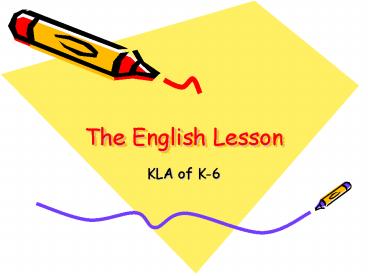The English Lesson PowerPoint PPT Presentation
1 / 15
Title: The English Lesson
1
The English Lesson
- KLA of K-6
2
- Once upon a time an English class had to learn
about English. In this lesson they were taught
the outcomes and content of the English KLA, as
well as values and attitudes. They learnt the
links between English and other KLAs and how the
outcomes of English applicate to the real world
outside the classroom.
3
- The eight values were
- Enjoy creating a range of spoken and written text
- Enjoy and experience responding to variety of
spoken and written text.
4
- Experiment with different aspects of spoken and
written language. - Show confidence in using language
5
- Show independence in using and learning language
- Choose to reflect on and share experiences
6
- Uses language to support and encourage
- Understand how language can include and exclude
others
7
- The four language tools and outcome based content
are - talking and listening outcomes,
- reading outcomes and
- writing outcomes.
8
- These four develop through Stage 1, 2 3. They
result with the student gaining student
competence in learning and using language in a
broad range of contexts. - The main insight drawn on in English is to make
meaning through language. This is what each
language tool, talking, listening, reading and
writing, help to attain and develop in the
student.
9
- The knowledge and skills and values and attitudes
in English are gained and grow from early stage 1
through to late stage 3. - Students learn how to interact productively with
peers, speak confidently in class discussion,
listen strategically, read with comprehension,
and to write well-structured, coherent texts.
10
Linking KLA-to other KLAs
- English is a vital KLA as it is central to a
students intellectual, social and emotional
development and has an essential role in all
KLAs. As it is the subject responsible for the
education of language, it assists students in
interpreting and understanding the other KLAs.
11
- Most subjects such as math, science and HSIE
indefinitely require talking and listening
outcomes when involved in class discussion to
comprehend lessons and present their own ideas
about issues and topics brought up in the class. - Reading and writing is also essential especially
for humanity subjects such as science and HSIE
when preparing and setting out work, and
understanding the requirements of language in
presentation
12
- Such as a geography project needing a summary on
a country and a spoken presentation, the student
needs the knowledge of formal spoken language in
the classroom, and being able to read chosen
texts in order to write out their summary of the
topic, sentence construction, spelling and
grammar are also required knowledge.
13
Link KLA- to outside world
- It then goes beyond the classroom and becomes
part of the students everyday life where talking,
listening, reading and writing is expected such
as applying for jobs, emailing, having
spontaneous topic related conversations either
formally or informally.
14
- The Board of Studies defines the link between
English and the outside world as that competence
in English will enable students to learn about
the role of language in their own lives, and in
their own and other cultures..
15
- They will then be able to communicate their
thoughts and feelings, to participate in society,
to make informed decisions about personal and
social issues and to analyse information and
viewpoints, to use their imaginations and to
think about the influences of culture on the
meanings made with language (English K-6
Syllabus, Board of Studies, 1998)

